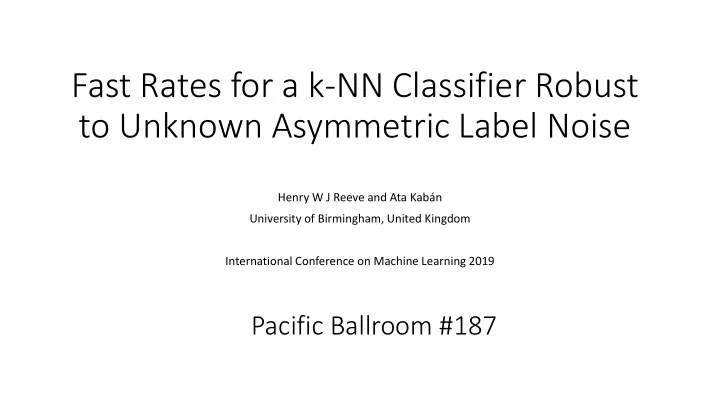

Fast Rates for a k-NN Classifier Robust to Unknown Asymmetric Label Noise Henry W J Reeve and Ata Kabán University of Birmingham, United Kingdom International Conference on Machine Learning 2019 Pacific Ballroom #187
Learning with asymmetric label noise Suppose we have a distribution over . Our goal is to obtain a classifier which minimizes We would like uncorrupted data: i.i.d. Instead, we have corrupted data: i.i.d.
Learning with asymmetric label noise There exist label noise probabilities with 1. 2. Samples consist of a feature vector and a noisy label .
Applications Asymmetric class-conditional label noise occurs in numerous applications: • Nuclear particle classification - distinguishing neutrons from gamma rays (Blanchard et al., 2016) • Protein classification and other problems with Positive and Unlabelled data (Elkan & Noto, 2009)
The Robust k-NN classifier of Gao et al. (2018) Let be the k-nearest neighbors regression estimator based on 1) Estimate the label noise probabilities 2) Binary k-nearest neighbor prediction with a label noise dependent threshold:
The Robust k-NN classifier of Gao et al. (2018) The Robust k-NN classifier was introduced by Gao et al. (2018) who: 1) Conducted a comprehensive empirical study which demonstrates that the method typically outperforms a range of competitors. 2) Proved finite sample bounds. However, a) Fast rates ( ) have not been established. b) The bounds assume prior knowledge of the label noise . In our work the label noise probabilities are unknown!
Range assumption We adopt the range assumption of Menon et al. (2015):
Non-parametric assumptions We also adopt the following non-parametric assumptions: A) Measure-smoothness assumption : B) Tysbakov’s margin assumption :
Fast rates for the Robust k-NN classifier Main result (Reeve & Kabán, 2019) Suppose that satisfies (1) the range assumption, (2) the measure-smoothness assumption, (3) Tsybakov’s margin assumption. With probability at least over the corrupted sample , the Robust k- Nearest Neighbor classifier satisfies Matches the minimax optimal rate for the noise free setting (up to log factors)!
Conclusions Pacific Ballroom #187 • We established fast rates for the Robust k-NN classifier of Gao et al. (2016) • A high probability bound is established for unknown asymmetric label noise • The finite sample rates match the minimax optimal rates for the label-noise free setting up to logarithmic factors (e.g. Audibert & Tsybakov, 2006) • As a biproduct of our analysis we provide a high probability bound for determining the maximum of a noisy function with minimal assumptions. Thank you for listening!
Recommend
More recommend